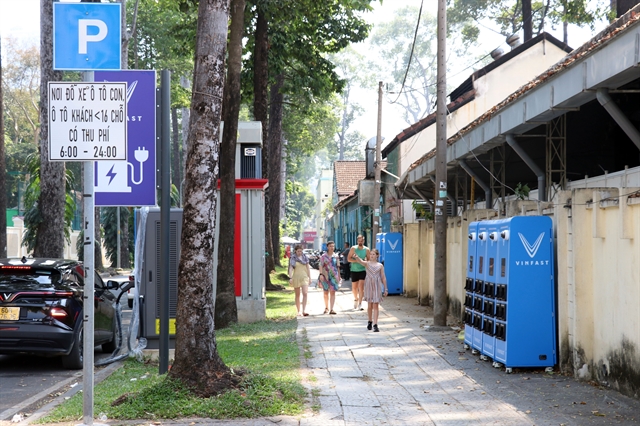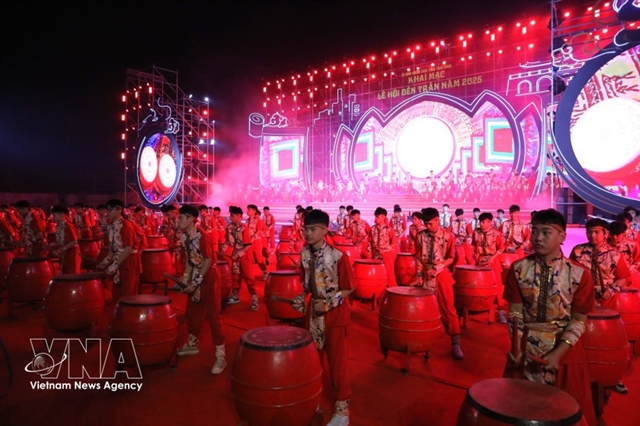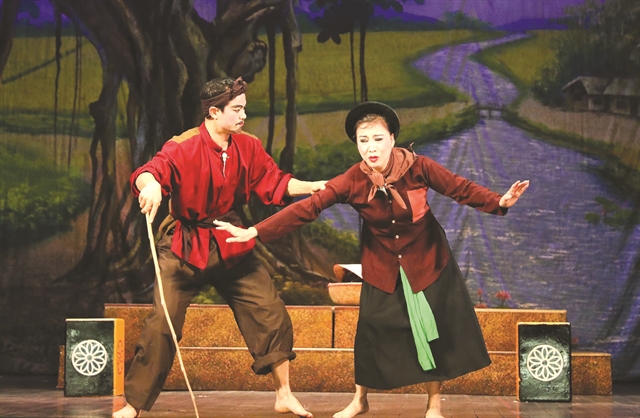 Features
Features

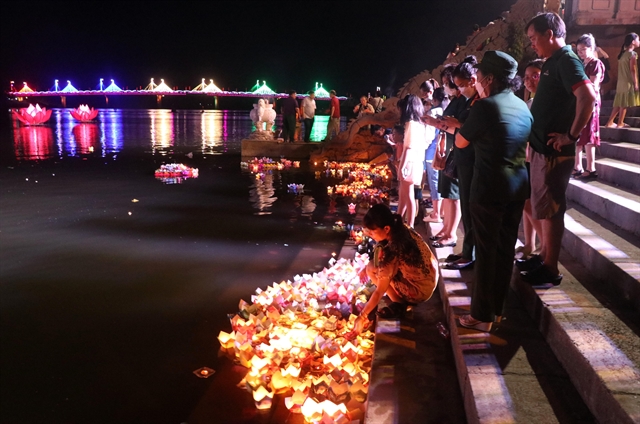 |
Tourists, mostly war veterans, release flower lanterns into the Thạch Hãn River to pay tribute to fallen soldiers. VNA/VNS Photo Nguyên Lý
Flower lanterns adorned with candles were tenderly released into the Thạch Hãn River, as war veteran Lê Hoa from Hà Nội emotionally recalled his comrades who lost their lives on brutal battlefields in the central province of Quảng Trị during the war against the US.
Fifty years ago, a bloody 81-day battle to protect Quảng Trị's ancient citadel took place, claiming the lives of thousands of Vietnamese soldiers and civilians.
An estimated 328,000 tonnes of bombs were dropped on the old citadel and the surrounding area, equivalent to 100 tonnes of bombs and 200 artillery shells for every soldier of the North Vietnamese army.
Although the veteran goes to Quảng Trị on almost every War Invalids and Martyrs Day (July 27), this was the first time he, together with other 60 tourists, most of whom were also veterans, visited the special national historical site of Quảng Trị Ancient Citadel at night. The sacred atmosphere and shimmering lights filled all who attended the rituals with profound emotion.
"The bright and shimmering lights made the citadel – the place of worship of the war martyrs during the resistance war – even more sacred. Now, there are still many nameless martyrs' graves in the cemetery. I'm touched every time I come here," Hoa said.
His visit is part of the night tour that is being piloted for the first time by the Quảng Trị provincial authority this July.
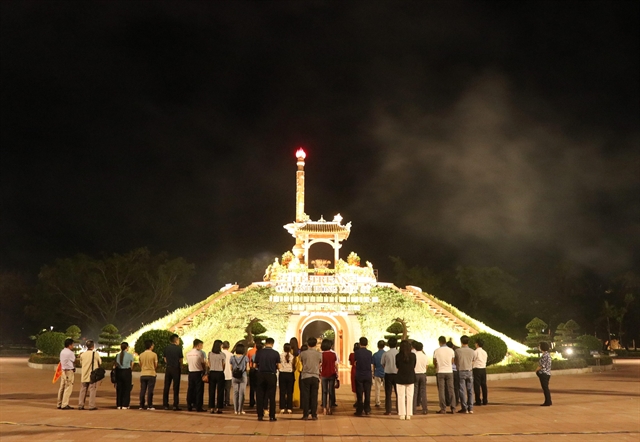 |
Tourists explore Quảng Trị Ancient Citadel at night. — VNA/VNS Photo Nguyên Lý
According to Lê Minh Tuấn, director of the Provincial Department of Culture, Sports and Tourism, the spiritual tour aims to pay tribute to the fallen heroes of the nation, attract tourists to explore the province at night, honour national historical values, and educate the younger generations in the tradition of patriotism.
The tour begins with a ceremony offering incense and flowers at the Ancient Citadel and the Thạch Hãn River, which is regarded as a cemetery of thousands of martyrs. During the ceremony, visitors are introduced to the fierce 81-day battle in the summer of 1972.
A boat then heads to the middle of the river to release floating lanterns to commemorate and pay tribute to the fallen.
Quảng Trị is also planning to launch a night tour to the Hiền Lương Bridge – Bến Hải River historical complex, a special national relic. During the anti-American war, the Bến Hải River and Hiền Lương Bridge was the temporary boundary dividing Việt Nam into north and south, and bore witness to the Vietnamese people's fierce but glorious struggle for national reunification.
Participants can pay a visit to the border flagpole, take a walk along the historical bridge, and offer incense and flowers to soldiers who sacrificed their lives while on duty at the bridge.
Holding a bouquet of white lilies on revisiting his fallen comrades at Quảng Trị Ancient Citadel, 72-year-old veteran Phạm Hồng Cam from the central province of Thanh Hóa, who participated in the fight to protect the citadel in 1972, was overwhelmed with past memories.
"I'm fortunate to have survived the war, but my comrades have remained on this land forever. They fell at the most beautiful age of life to write an immortal epic in defending the motherland. They dedicated their lives for the peace of the nation so that today's younger generation can better understand and treasure the value of peace," he said.
City of peace
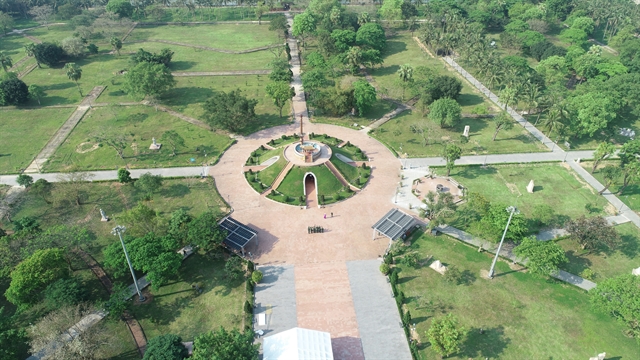 |
The aerial view of Quảng Trị Ancient Citadel where the fierce 81-day-and-night battle took place 50 years ago. — VNA/VNS Photo Thanh Thủy
During the war Quảng Trị Town was razed, and the fields were deserted, full of bomb craters and mines.
However, 50 years on from liberation day, the town has regained its life vigorously from the ashes.
The Resolution of the Party Congress of Quảng Trị Town for the 2020-2025 tenure has stressed the task of building the town into a wealthy, beautiful, and hospitable locality, orienting it towards a city of peace.
As home to the historical relic of Quảng Trị Citadel and numerous war relics, the town has been making efforts to promote such advantages for development, the focus of which is the launch of spiritual and nostalgic tourism programmes like the night tours to the Thạch Hãn River and the ancient citadel.
The programmes contribute to economic and social development by creating jobs for local people and highlighting the Vietnamese people's aspirations for peace.
Besides the night tours to war relics, Quảng Trị plans to launch a festival for peace within the memorial space of the ancient citadel every two years in July.
The festival for peace is expected to feature a wide range of art performances, exhibitions and seminars, and other honouring activities, mainly in Đông Hà City, Cửa Việt, Cửa Tùng, Quảng Trị Town, the Trường Sơn and Road 9 War Martyrs cemeteries, and the Hiền Lương-Bến Hải historical relic site.
 |
A veteran offers incense to commemorate the war martyrs at the ceremonial house by the Thạch Hãn River. — VNA/VNS Photo Nguyên Lý
"Quảng Trị is a land full of deep affection for comrades, compatriots from all over the country and international friends," said Vice Chairman of the Provincial People's Committee Hoàng Nam.
"When it has become a city of peace, the wish of tens of thousands of people who shed their blood for national reunification will have been fulfilled." VNS


